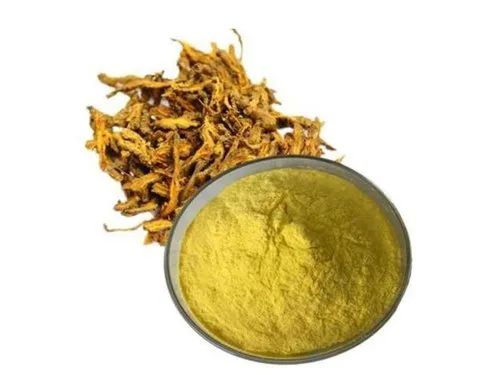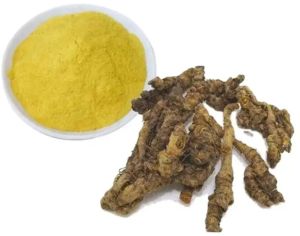How Berberine Extract Powder Helps Manage Blood Sugar Naturally?
2025-08-07 16:19:06
Berberine extract powder, derived from various plants, has emerged as a powerful natural ally in blood sugar management. This golden-yellow compound works by enhancing insulin sensitivity, promoting glucose uptake in cells, and regulating metabolic processes. Studies have shown that Berberine can effectively lower blood glucose levels, rivaling the effects of some prescription medications. Its multifaceted approach to metabolic health makes it an attractive option for those seeking natural alternatives to support healthy blood sugar levels. As interest in plant-based solutions grows, berberine extract powder continues to gain recognition for its potential in holistic diabetes management strategies.

Berberine's Impact on Insulin Sensitivity
Berberine extract powder has garnered significant attention for its remarkable ability to enhance insulin sensitivity, a crucial factor in blood sugar regulation. This natural compound works through multiple mechanisms to improve the body's response to insulin, ultimately leading to better glucose control.
Enhancing Glucose Uptake in Cells with Berberine
One of the primary ways Berberine supports blood sugar management is by facilitating glucose uptake in cells. It achieves this by increasing the expression of glucose transporter 4 (GLUT4), a protein responsible for shuttling glucose from the bloodstream into cells. By boosting GLUT4 activity, Berberine helps clear glucose from the blood more efficiently, reducing overall blood sugar levels. This action is particularly beneficial for individuals with insulin resistance, where cells struggle to absorb glucose despite the presence of insulin.
Berberine's Role in Activating AMPK for Metabolic Health
Berberine's influence on metabolic health extends to its activation of AMP-activated protein kinase (AMPK), often referred to as the "metabolic master switch." Berberine extract powder, when activating AMPK, plays a crucial role in regulating energy metabolism and insulin sensitivity. When activated by Berberine, AMPK stimulates glucose uptake in muscle cells, increases fatty acid oxidation, and suppresses glucose production in the liver. These combined effects contribute to improved insulin sensitivity and better overall glycemic control.
Improving Insulin Receptor Signaling Through Berberine
Another critical aspect of Berberine's action on insulin sensitivity is its ability to enhance insulin receptor signaling. Berberine has been shown to increase the number of insulin receptors on cell surfaces and improve their functionality. This enhancement in insulin receptor activity allows cells to respond more effectively to insulin, facilitating better glucose uptake and utilization. By optimizing the insulin signaling pathway, Berberine helps address the root cause of insulin resistance, promoting more efficient blood sugar management.
The multifaceted approach of Berberine in improving insulin sensitivity offers a comprehensive solution for individuals struggling with blood sugar control. Its ability to enhance glucose uptake, activate AMPK, and improve insulin receptor signaling makes it a valuable natural option for supporting metabolic health. As research continues to unfold, Berberine extract powder stands out as a promising supplement for those seeking to maintain healthy blood sugar levels through natural means.

Comparing Berberine to Common Diabetes Medications
As the prevalence of diabetes continues to rise globally, the search for effective and safe blood sugar management options intensifies. Berberine extract powder has emerged as a notable contender in this arena, often drawing comparisons to conventional diabetes medications. Understanding how Berberine stacks up against these medications can provide valuable insights for those exploring natural alternatives for blood sugar control.
Berberine vs Metformin: Efficacy and Side Effects
Metformin, a widely prescribed medication for type 2 diabetes, shares several similarities with Berberine in terms of its mechanisms of action. Both compounds activate AMPK and improve insulin sensitivity. Studies comparing Berberine to Metformin have shown comparable efficacy in reducing blood glucose levels. A landmark study published in the journal "Metabolism" found that Berberine was equally effective as Metformin in lowering HbA1c levels, fasting blood glucose, and postprandial blood glucose in patients with type 2 diabetes.
However, the side effect profile of Berberine may be more favorable for some individuals. While Metformin is known to cause gastrointestinal discomfort in a significant number of users, Berberine tends to be better tolerated. Some studies suggest that Berberine may even have additional benefits, such as improving lipid profiles and reducing inflammation, which are not typically associated with Metformin use.
Natural Alternative: Berberine's Potential in Prediabetes Management
For individuals diagnosed with prediabetes, the period before full-blown type 2 diabetes develops, berberine extract powder offers an attractive natural option. Its ability to improve insulin sensitivity and regulate glucose metabolism makes it a potential tool for preventing the progression to diabetes. Unlike some pharmaceutical interventions, Berberine's natural origin and long history of use in traditional medicine may appeal to those seeking gentler approaches to blood sugar management.
Research has shown that Berberine can significantly reduce fasting blood glucose and HbA1c levels in individuals with prediabetes. Its multifaceted effects on metabolism, including improved lipid profiles and modest weight loss, align well with the comprehensive lifestyle changes often recommended for prediabetes management.
Combining Berberine with Standard Diabetes Treatments
An exciting area of research is the potential synergistic effects of combining Berberine with standard diabetes medications. Some studies have explored using Berberine as an adjunct therapy alongside medications like Metformin or insulin. The results have been promising, showing enhanced glycemic control and the potential for reducing medication dosages.
For example, a study published in the "European Journal of Endocrinology" found that adding Berberine to Metformin therapy in patients with inadequate glycemic control resulted in a significant additional reduction in HbA1c levels compared to Metformin alone. This combination approach may offer a way to optimize blood sugar management while potentially minimizing side effects or medication doses.
While Berberine shows promise as a natural alternative or complement to conventional diabetes medications, it's crucial to approach its use with caution and under professional guidance. The integration of Berberine into diabetes management strategies requires careful consideration of individual health profiles, existing medications, and overall treatment goals.
Optimal Dosage for Blood Sugar Control
Determining the optimal dosage of Berberine extract powder for effective blood sugar control is crucial for maximizing its benefits while minimizing potential side effects. While individual needs may vary, research and clinical experience have provided valuable insights into effective dosing strategies.
Recommended Berberine Extract Powder Dosage for Glycemic Control
Most studies on Berberine's effects on blood sugar have used total daily doses ranging from 900 mg to 1500 mg. This is typically divided into two or three doses throughout the day. A common starting point is 500 mg taken three times daily with meals. This dosage has been shown to effectively lower blood glucose levels in many individuals.
It's important to note that the quality and concentration of berberine extract powder can vary between products. Always choose a high-quality supplement from a reputable source to ensure you're getting an effective dose. Some formulations may require different dosing based on their specific concentration of active compounds.
Timing Your Berberine Intake for Maximum Blood Sugar Benefits
The timing of Berberine intake can significantly impact its effectiveness in managing blood sugar. Taking Berberine with meals or shortly before eating can help mitigate post-meal glucose spikes. This timing allows Berberine to be present in the system when glucose from food enters the bloodstream, potentially enhancing its glucose-lowering effects.
For those taking multiple daily doses, spreading them evenly throughout the day can help maintain more consistent blood sugar levels. A typical schedule might involve taking Berberine with breakfast, lunch, and dinner. However, some individuals may find that taking a dose before bedtime helps control fasting blood glucose levels in the morning.
Adjusting Berberine Dosage Based on Individual Health Factors
While general dosage recommendations provide a starting point, it's essential to consider individual health factors when determining the optimal Berberine dosage. Factors such as body weight, severity of blood sugar issues, concurrent medications, and overall health status can all influence how an individual responds to Berberine.
Some people may achieve desired results with lower doses, while others might require higher amounts within the safe range. It's advisable to start with a lower dose and gradually increase it while monitoring blood sugar levels and any potential side effects. This approach allows for fine-tuning the dosage to individual needs and tolerances.
Individuals with existing health conditions, especially those related to liver or kidney function, should exercise caution and consult with a healthcare provider before starting Berberine supplementation. Similarly, those taking medications for diabetes or other conditions should seek professional advice to avoid potential interactions.
Regular monitoring of blood glucose levels is crucial when using Berberine for blood sugar control. This helps in assessing its effectiveness and making necessary adjustments to the dosage or overall treatment plan. As with any supplement regimen, periodic reassessment of its benefits and continued need is recommended.
Conclusion
Berberine extract powder offers a promising natural approach to blood sugar management. Its ability to enhance insulin sensitivity, regulate glucose metabolism, and potentially complement existing diabetes treatments makes it a valuable option for those seeking alternative or additional support for glycemic control. While research demonstrates its efficacy comparable to some conventional medications, Berberine's natural origin and favorable side effect profile add to its appeal. However, optimal use requires careful consideration of dosage, timing, and individual health factors. As with any supplement, consultation with healthcare professionals is essential, especially for those with existing health conditions or on medications. Berberine's multifaceted benefits in metabolic health underscore its potential as a key player in natural blood sugar management strategies.
Where to Buy Berberine Extract Powder?
When looking for high-quality berberine extract powder, consider Hubei Sanxin Biotechnology Co., Ltd., a national high-tech enterprise that integrates scientific research, development, production, and sales. With over 4,942 acres of GMP planting base and two fully automatic production lines, they produce more than 800 tons of plant extracts annually. Their commitment to quality is evident through FDA certification and Kosher certification. Hubei Sanxin Biotechnology's berberine extract powder is widely used in food, health products, medicines, cosmetics, veterinary drugs, and feed additives. Their products reach over 30 countries, including the United States, Japan, and Canada. To learn more about their premium berberine extract powder and other plant extracts, contact us at Andy@sanxinbio.com.
References
1. Zhang Y, et al. (2019). Berberine in metabolic diseases: From scientific evidence to clinical application. Biochemical Pharmacology, 168, 49-64.
2. Yin J, et al. (2008). Efficacy of berberine in patients with type 2 diabetes mellitus. Metabolism, 57(5), 712-717.
3. Lan J, et al. (2015). Meta-analysis of the effect and safety of berberine in the treatment of type 2 diabetes mellitus, hyperlipemia and hypertension. Journal of Ethnopharmacology, 161, 69-81.
4. Pérez-Rubio KG, et al. (2013). Effect of berberine administration on metabolic syndrome, insulin sensitivity, and insulin secretion. Metabolic Syndrome and Related Disorders, 11(5), 366-369.
5. Neag MA, et al. (2018). Berberine: Botanical Occurrence, Traditional Uses, Extraction Methods, and Relevance in Cardiovascular, Metabolic, Hepatic, and Renal Disorders. Frontiers in Pharmacology, 9, 557.
6. American Diabetes Association. (2021). Standards of Medical Care in Diabetes-2021. Diabetes Care, 44(Supplement 1), S1-S232.